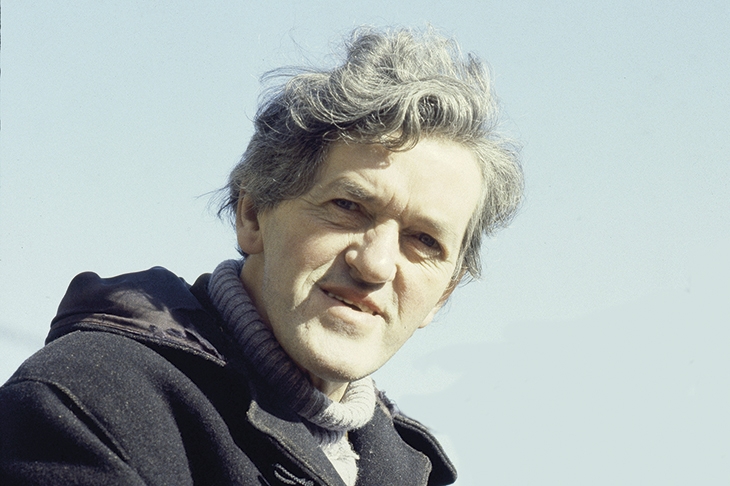Few journalists can have conducted such a dismal interview as mine with George Mackay Brown in the summer of 1992. The Times had sent me to Orkney, and the night before we met I sat up in my B&B reading his poetry, spellbound. So much to ask him! But that first meeting was a disaster. Brown was so shy he answered my questions in monosyllables. After five minutes he sat back and rested his lantern jaw on long hands, silent. Seamus Heaney called Brown ‘the praise singer’. There was no singing that afternoon.
But the next day I ran into Brown at Mass (he was that rare thing, an Orcadian Catholic). He invited the whole congregation — five of us — to tea. In familiar company he was transformed: a generous host, a brilliant raconteur. As I left, he showed me something that had arrived in the post: a facsimile of the letter Mary Queen of Scots wrote to her cousin the King of France the night before her execution. He drew my attention to ‘the firmness of her script in the face of death’.
Soon after I got back to London, a letter arrived with a Stromness postmark. ‘I hope you will come back often, Maggie,’ Brown wrote. ‘I feel you belong here in Orkney.’ I did go back, often, and an unlikely friendship blossomed. A few months before he died, he gave me his blessing to write his life.
On 17 October it will be 100 years since Brown was born, the sixth child of a postman and tailor, into a family so poor that he and his siblings ran through the Orkney summers barefoot. Polygon are marking this with three handsome editions of Brown’s works.
In familiar company George was transformed: a generous host, a brilliant raconteur
Stella Cartwright, Brown’s tragic muse, once spoke of his gift for writing with ‘involved detachment’. She put it perfectly. He was passionately present in every word he wrote, but he almost never used the word ‘I’. In the introduction to Carve the Runes, Kathleen Jamie reflects on how this ‘stepping back’ allowed him to ‘become a craftsman’. Her selection of 100-odd poems includes ‘Thorfinn’, much admired by Ted Hughes and based on the true story of a Stromness lad, a poultry thief, who rowed out beyond the harbour one evening and drowned. Nobody knew exactly how he met his end, but Brown suggests that
Love, abroad in a seeking waveLifted him from the creaking rowlocks of timeAnd flung a glad ghost on a wingless shore
And there is ‘The Harrowing of Hell’, completed days before Brown died, in which Christ makes a spiral, luminous descent into the underworld, freeing the great figures of the Old Testament, preparing the way for the Resurrection:
Tomorrow the Son of Man will walk in a gardenThrough drifts of apple-blossom.
Some think Brown’s crystalline, fierce short stories as remarkable as his poems, and in Simple Fire Malachy Tallack has made a marvellous selection of 18 of them. For me, the gem — a favourite of Ali Smith — is ‘Witch’, inspired by Orkney’s 17th-century witch trials. Imprisoned in the laird’s house, an innocent 18-year-old country girl, Marian Isbister, spends her last hours tortured physically and verbally by her accusers. There are echoes of the Passion; as she realises that her fate is sealed, she slowly falls silent. The morning of her execution, her nails are removed with pincers, so that as she is carried through the streets of Kirkwall her fingers hang ‘like a tangle of red roots at the end of her long white arms’. But goodness is found in Piers, the hangman, who whispers to Marian beneath the jeers of the crowds that he will make her end swift.
The reissue of An Orkney Tapestry, out of print since 1978 (Brown was a ferocious self-censor), is especially exciting. This interweaving of lore, drama and poetry is shot through with his flair for capturing very ordinary things — the ‘slow, laconic, surging speech’ of the Orcadians, the weather:
A city shower is a meaningless nuisance, a liquidity seeping into collar and trouser-leg. In the north, on a showery day, you can see the rain, its lovely behaviour over an island — while you stand a mile off in a patch of sun.
Most arresting are the pages on Rackwick, the sea valley on Hoy littered with abandoned crofts, its community leached away during the early 20th century by the blandishments of ‘progress’: ‘The notion of progress is a cancer that makes an elemental community look better, and induces a false euphoria, while it drains the life out of it remorselessly.’ It was this chapter that lured Peter Maxwell Davies to move to Rackwick and to compose some of his best work there.
All of Brown’s writing is based in Orkney, which he rarely left (he only once visited England). Is this a weakness? I always felt that, by drawing his boundaries so closely around him, he freed his imagination to travel through time and space. So I was delighted when, as I worked on my biography, in the course of a thrilling exchange of faxes, Seamus Heaney wrote this:
My hunch is that if George had made a move to ‘develop’, that’s when we’d have sensed a weakness. Orkney wasn’t just a setting, wasn’t just material. It was his gateway to the completely imagined… He strikes me as one who followed his true course. He didn’t fail himself.
Carve the Runes: Selected Poems, edited by Kathleen Jamie; Simple Fire: Selected Short Stories, edited by Malacky Talack; An Orkney Tapestry, edited by Linden Bicket and Kirsteen McCue (Polygon, £12.99 each).






Comments